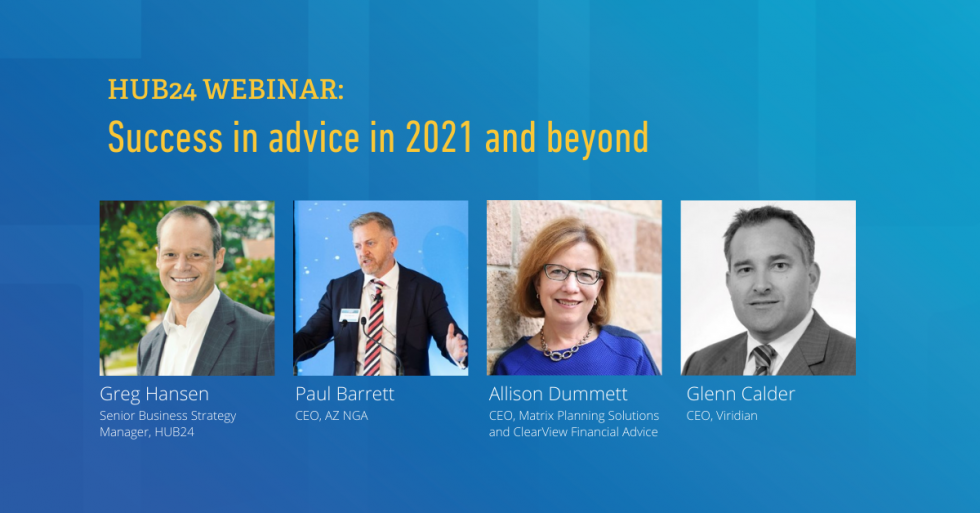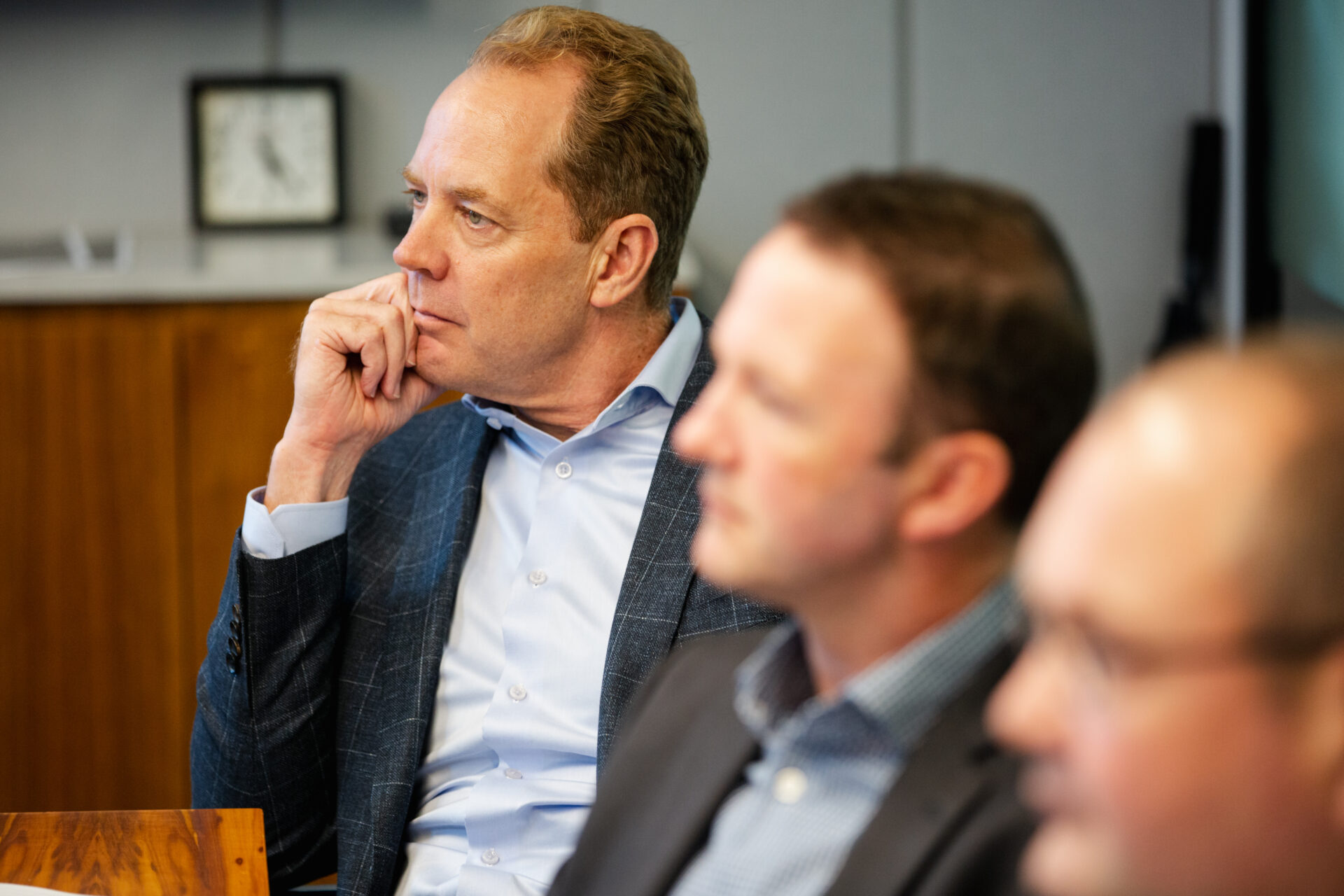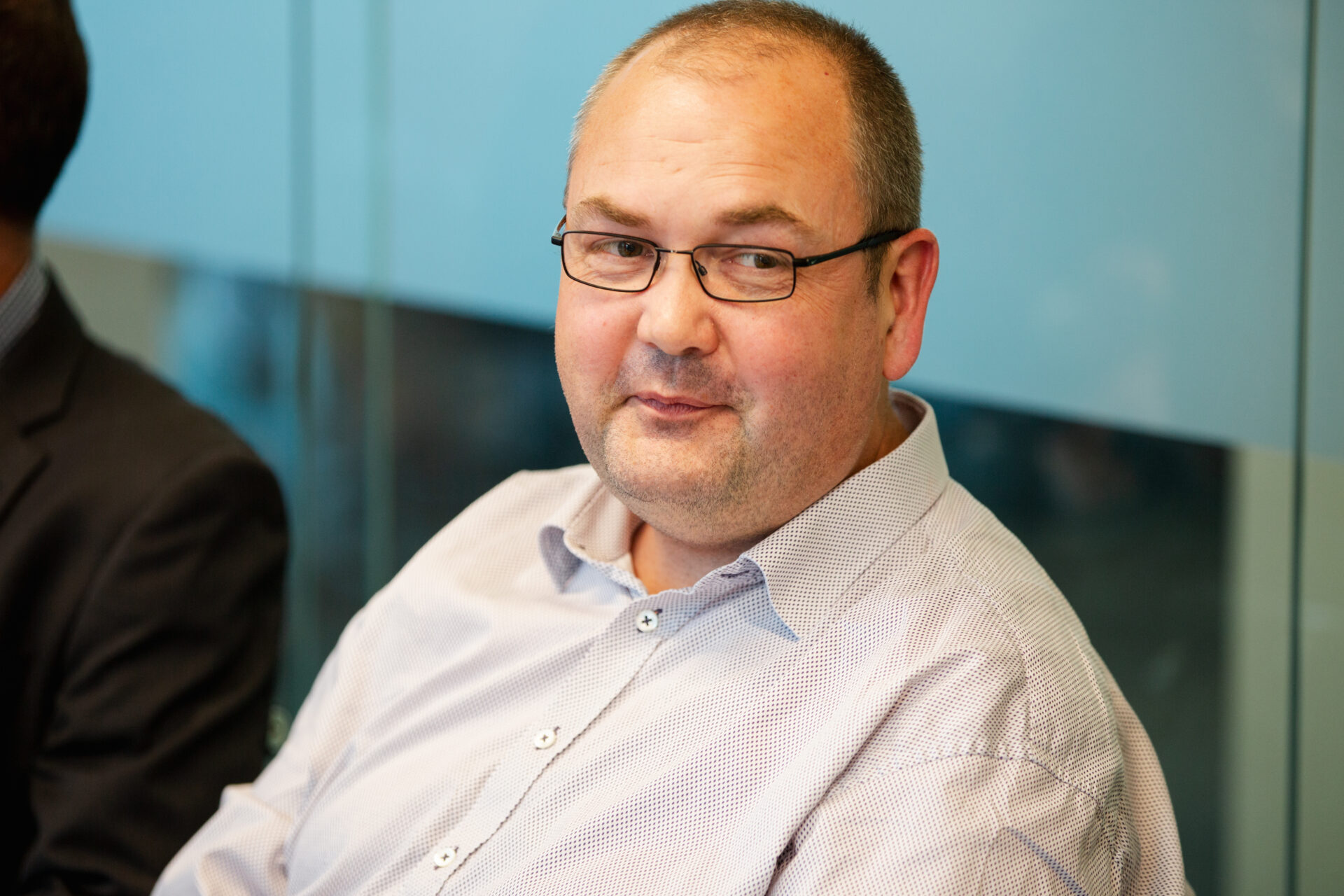Part 1 – Mindset, entrepreneurialism, and growing advice
In Part 1 of our transcript from our recent webinar session with HUB24’s Senior Business Strategy Manager Greg Hansen, leaders of change in the advice industry – AZ NGA CEO Paul Barrett, Viridian CEO Glenn Calder and Matrix Planning Solutions and ClearView Financial Advice CEO Allison Dummett – discuss how they are working with practices and advisers to encourage entrepreneurialism, challenge profitability, achieve digital connectivity and collaborate to advance advice.
Greg Hansen (GH) – Can you tell me a bit about your businesses?
Allison Dummett (AD) – I am the CEO of two licensees – Clearview Financial Advice and Matrix Planning Solutions – different brands, but behind the scenes it’s one kitchen with many restaurants and one back office. We primarily work with self-employed advisers – all up we have around 200 or so advisers across Australia.
Glenn Calder (GC) – Viridian Advisory formed in 2015. We just wanted to do things a little bit differently after coming out of major institutions. Our model is around promoting everyone to share ownership. We run two licenses as well – Viridian Advisory License is a self-employed channel and Viridian Select for self-employed advisers who are culturally aligned with where we are heading, which is around the future direction of the industry.
Paul Barrett (PB) – AZ NGA formed six years ago. We are an investor in professional advisory services SMEs, so accounting firms, financial planning firms and other financial service companies. What we try and do is help those firms use capital and debt to grow. We have a succession solution and a whole lot of other solutions for those firms to access.
Greg Hansen (GH) – I’m interested in the mindset you think advisers should have to grow and succeed in business?
AD – For businesses to grow – and in many instances to continue their transformation in what has been a very different landscape to what many signed on for – I think the first thing they must do is look at the assets they have rather than focusing on the raft of changes they’ve weathered.
For many of them their major assets are:
- themselves – their own very valuable skills
- the personal client relationships they have
- the financial value of those contracts
One of the things I am finding quite exciting is talking to businesses where they are starting to ask: armed with what I’ve got, where do I take my business next? Some are expanding the services they offer, some are specialising and some are looking at strategic alliances with accountants and aged care experts.
GH – Paul, have you got some perspectives on how businesses grow and develop?
PB – We asked the questions:
- Who do we know?
- What are we good at?
- What are the problems we know people are trying to solve?
- And based on what we are good at, can we help them solve them?
We went through this very basic framework–myself, and my business partner–right at the outset and the answers to those questions, we answered deeply, spent about six months on those questions. And to the question who do we know, we had this big piece of white paper on the dining room table and we thought about every single cohort that we knew. I did it on my own to start with because one of the cohorts on my piece of paper was mothers’ group because I literally asked the question who do I know in my entire group, and I had mothers’ group down there.
I think the end outcome of that exercise is often a far more focussed, clear goal strategy value proposition. What we are seeing is businesses, generalists recalibrating and becoming specialists or having a deeper or narrower focus because consumers want that. Consumers are less willing to pay for something that is generalist or vanilla and far more open to paying proper fees for what they see as specialised, deep rather than narrow services. Many of our larger firms are recalibrating and coming back with a collection of specialisations. So, they are still a large firm servicing a general population, but doing that in a more focussed way.
GH – Can you give us some examples, Paul, in your network of how some people have gone about it?
Accessing data and cleaning it
PB – There’s a great example in Melbourne in a firm who has got this remarkable approach to the pharmacy sector as the consumer demographic they want to service. And they asked themselves, what problem do pharmacists have that they want to solve? And as a result of going through that very deep analysis, they are now in the rent roll business, they are now in the residential real estate business, they’re in the mortgage broking busines and general property services as well as accounting and tax because they looked at the lifecycle of a pharmacist who can only make wealth through two things – one is property investment and the other is M& A in pharmacies (they have an M& A capability as well) so that’s their deep and very narrow proposition and they are one of the highest performing businesses.
To do that, you’ve got to think like an entrepreneur. I have this somewhat cynical view of the role the regulations and licensees have played over the past 20 years. I think have they ultimately dampened innovation and entrepreneurship in financial planners.
I remember as a younger dealer group executive being the person who would whack the planners as they poke their heads up whether it be on, they can’t do this or they can’t do that. But in the past, a licensee was a distribution vehicle for an institution, so giving property advice to a client wasn’t on the agenda because the licensee’s job was to make sure flows went into platforms and investment products. And of course, investing in property is the antithesis of that and that’s the truth of the matter. That’s why the old licensee model failed ultimately, because consumer needs weren’t being met. If you keep whacking the advisers year in and year out for 20 years and keep telling advisers they can’t give property advice for example, well eventually they are not going to try again. They are going to run out of innovation, and they are going to run out of the energy to pursue that client pursuit.
Whereas today I think what needs to happen is business owners need to ask themselves:
- What are my clients’ needs?
- Can I arrange the capability, or do I already have it?
- Can I get it through M&A or merging or bring the capability in to service the client need?
AD – Limiting advice is an old view of the world; licensees need to be more supportive, and I think it starts with taking a different view of what advice can be offered. In regards to expanding advice businesses into property- related services, that can start more organically with strategic property advice. Many clients want to know what to do with an existing property, whether it is their home or an investment property, and licensees need to enable that sort of strategic advice while still complying with regulations around very specific credit advice.
PB – I am not suggesting for a second that the planner licence with Matrix should start doing property advice under that licensee arrangement – what I am suggesting is if they take a step back as an entrepreneur and look at what other entity structures can I bring about, what other licensing avenues can I use to provide that service to a client? I think that advisers often only think that the licensee is the only structure, but in actual fact there are lots of other avenues to enable that proposition to take to the client and often that’s through M&A.
GC – The Regulator seems to me and any interaction we have ever had, they say, “Tell me about the client in all of this,” and they start from the client. It seems to me regulation comes in after the fact and it does crimp a lot of things, but I am not sure that it stops innovation. And it shouldn’t stifle innovation because if we are dealing directly with the client and their needs and wants, they are changing all the time–and if we are slow, we become irrelevant.
GH – Paul, have you got some perspectives on how businesses grow and develop?
PB – The biggest part of an average Australian’s portfolio is probably property and maybe super, so I think it’s a massive miss if financial advisers aren’t allowed to advise on it. And I am not suggesting the licensee has to have all the answers, in fact what I am suggesting is the opposite. Because the licensee historically–and maybe the transition is still going on–is very good at a number of things and is incredibly valuable as part of the proposition. All I am saying is that the business owner is waiting for that particular opinion, but there are other avenues for that business owner to pursue other propositions for the client.
The accountants tend to do it really well. The accountants can take that strategic advisory proposition forward, the M&A proposition forward and the thing that comes first in all of this is getting the capability and the capability is either hired, earned or bought. Once you’ve got that capability and you have the confidence to take that proposition forward, the licensing piece comes next.
AD – If I look at the practices we have and this is a probably a case study across Australia, we have first generation businesses where those original businesses started with one adviser and a phone and basically built an asset from scratch into fantastic advice businesses. We have some second-generation businesses where sons or daughters or external parties have bought into those businesses but their challenges to transform are very different to the initial entrepreneur and the things that they are passionate about are very different as well. And then you’ve got people who have borrowed to buy a book as the basis for a new start up and are taking those risks on as well. Increasingly we are seeing firms employ additional staff and advisers to become more corporatized and many of these are expanding their service offering to diversify their businesses.
PB – It’s not just the regulation. The regulation has played a massive role – it’s definitely stifled some of that, but I think the business models are equally to be blamed. Business models have been set up as a distribution vehicle for something else. You combine that with the regulatory framework, and you get the situation we are in. The great news is innovative great new firms are popping up everywhere in the wake of all the RC and everything else that has been. They are really challenging that old business model and obviously Matrix and Viridian are doing that, so I think the future is looking pretty positive for true innovation and entrepreneurship.
GC – Isn’t that symptomatic of the size of the industry though? If you wind back 10 years ago you had the big institutions and a massive gulf and then tiny institutions at their peak of being entrepreneurial. We were big advocates of technology, for example, but you need to be a certain size to be entrepreneurial and to make some impact or difference otherwise you’re a taker of all services, it’s hard to be a developer of services. So, it’s got to be coming from size or specialisation or like you say, you buy in some of those skills as well. Surely now what is going on in the industry and some of the work you’re doing with people coming together for like-minded purposes, that’s promoting innovation isn’t it?
PB – I hope so. You’re talking about scale there and the need for firms to either get bigger themselves or be part of a community that is getting bigger, and I agree with that. The old days of having a million-dollar revenue practice or a sole trader practice is getting harder and harder. Three- and four-million-dollar practices are asking how I become an eight-million-dollar practice because the costs of doing this – delivering advice – are going up. There are also revenue headwinds. Good news is with scale comes better IP as well as better balance sheets and profit and losses. These firms that were once cottage industry firms are now becoming corporate modern SMEs with lots of horsepower and they’re able to provide far more sustainable value propositions for their clients and their staffs.
GH – Can you talk us through your perspective on a teams-based approach at Viridian?
GC – Part of it was a learning and in part it was a bit of reaction to some of our history where individualisation was a big part of measurement. Advisers were individual in their scope in how they dealt with clients, they were the expert in all matters. We are now finding and promoting the team approach and our mantra is: 1+1=3. We can get a greater result than the sum of individual parts and I guess that stems from the corporate structuring of our business. We made everyone shareholders in our business and in promoting that we shied away from shorter-term remuneration. We are finding that the greatest results we are getting out of advisers is the people that realise they are not all things to all people but are part of a bigger network now – we have aged care specialists, estate planning and insurance specialists. If you realise they are true specialisations and you have people in your business that you can go to, I think clients genuinely appreciate that.
We are now actually promoting that to the point where individual results will be discounted to a degree to the people who are getting teams-based results because I am a big believer of that. Different businesses can be stronger by working together and getting teams-based results.
AD – Having a strong team and brining in specialists when needed has to be better for the client , you won’t always be the solution in every sense of the word. You might invite other specialists to be part of that, but that attention to the strategic concerns of the client and getting to know those needs and addressing them, surely that is what we want to enable.
[ENDS]



